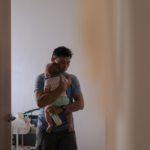Whether you’ve noticed a mate isn’t acting themself, a loved one is experiencing a major life event like job loss, or you just want to check in — asking whether someone is ok can be a critical first step in supporting someone who is struggling.
It’s good to be prepared for the answer to the question so you can offer the best care possible, especially if the person you’re asking is at risk of harm. Here’s what to do after asking “are you ok?”.
Listen
The first step after checking in with someone is to listen without judgment or criticism. If they need time to think or get the words out, sit patiently and don’t interrupt. Acknowledge what they’re saying and encourage them to explain how they’re feeling, using open-ended questions.
It doesn’t matter whether you think their worries are big enough, they should be taken seriously. Don’t try to ‘fix’ the problem or offer solutions.
If they don’t want to talk, let them know that you’re always there if they do.
Ask directly about suicide
Most Australians are confident in their ability to support those close to them if they’re in severe distress or at risk of suicide, listening, offering support, and encouraging them to seek professional help. However, people (and especially men) are less likely to have a deeper more direct discussion about suicidal thoughts, plans, and means, or to take action to assess the level of suicide risk and ensure someone’s safety.
There’s a misconception that asking someone about suicide might put the idea in their head or encourage them, but it’s important to discuss suicide if you think someone is at risk.
If the person confirms they are thinking about suicide, it’s important to find out if they’re in immediate danger. You may need to ask direct questions to find out how detailed their plans are.
Encourage and support the person to seek help
If you’re concerned a person is at immediate risk, contact emergency services straight away and stay with them (or ensure someone else does) until help arrives. If they’re not at imminent risk or you’re unsure, ask them about who else they could tell and involve. Suicidal thoughts should not be kept a secret and the number one priority is to keep the person safe.
If the person has made a plan around suicide, try to work with them to dismantle it and discuss how they could make their environment safer.
This can feel like a daunting topic to discuss. You don’t need to be an expert to start supporting someone, and you can get professional help involved. Options include calling a crisis support line together, going with them to the emergency department, connecting them with a doctor or psychologist, or taking them somewhere safe where they won’t be alone.
If a person is not at risk of suicide, ask how you can best support them. This can also involve encouraging them to see a health professional.
Check-in
Keep in touch to see how the person is going and if needed, connect with other people in their life who can also offer support.
Check in with yourself as well – supporting someone can be a challenging task. It can be good to chat with someone else, whether it’s a friend, family member, or professional.














